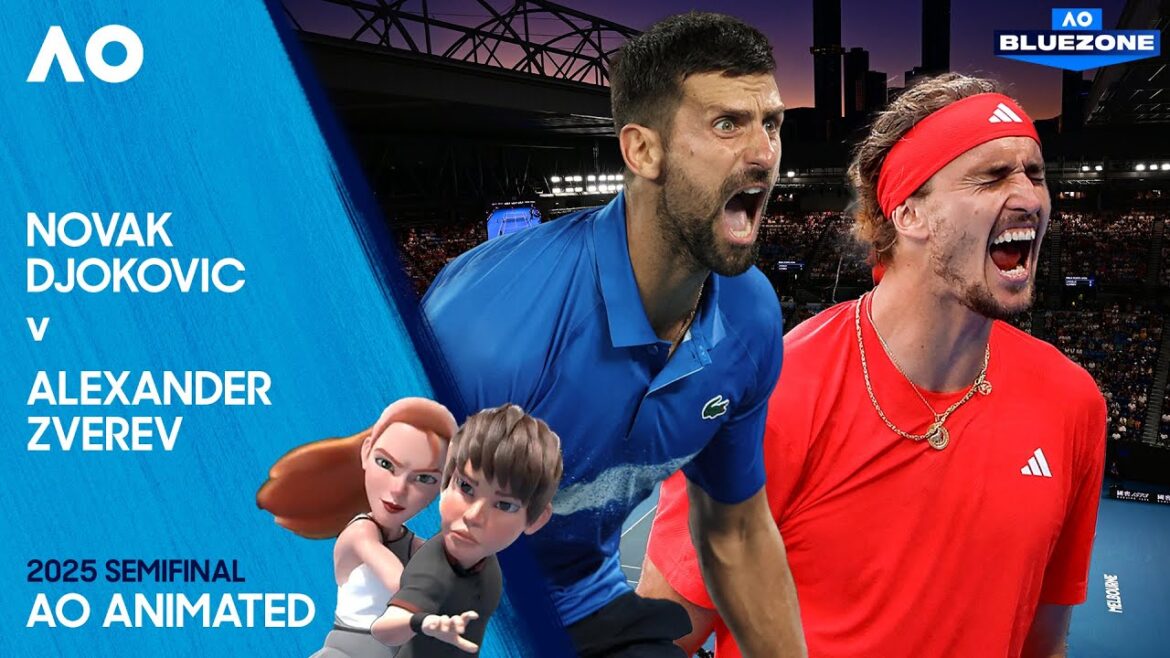Watch LIVE as Novak Djokovic faces Alexander Zverev on Rod Laver Arena on Day 13 of Australian Open 2025.
Subscribe to keep up with the latest from the Australian Open: http://bit.ly/AustralianOpenTV
Welcome to the official Australian Open TV YouTube channel. The Australian Open 2025 main draw runs from 12-26 January in Melbourne. The tournament takes place for the 113th time and is the first Grand Slam of the year. Jannik Sinner is the men’s singles reigning champion and Aryna Sabalenka is the women’s singles reigning champion. The tournament takes place on 25 hard courts, including Rod Laver Arena, Margaret Court Arena and John Cain Arena. Look out for highlights, press conferences, memorable moments and much more!
Facebook: https://www.facebook.com/AustralianOpen
X: https://twitter.com/australianopen
Instagram: https://instagram.com/australianopen/
TikTok: https://www.tiktok.com/@ausopen
Website: https://ausopen.com/
Follow live coverage of all matches, breaking news, updates, highlights and more on:
Nine (Australia): https://wwos.nine.com.au
Eurosport (Europe): https://www.eurosport.com
ESPN (Americas): https://www.espn.com
beIN Sports (South East Asia, MENA): https://www.beinsports.com
And visit: https://www.ausopen.com/broadcasters for all our broadcast partners worldwide


19 Comments
If she won first set . She will never retired. with out spirit from the actress 😅😅😅 maybe she bet herself -1.5 set or -2.5 set. Retired for save her money 😅😅😅
Cool, Novak pulled out early and Zverev is in the finals. Sure hope the words “faked injuries” won’t get mentioned in this comments section.
이거 왜 애니 캐릭터로 송출함?
Fake injury Novak got tired 😂😂
Zverev had a disaster injury before so he know Djokovics feelings
Mcenroe should be ashamed for saying Novak was faking his injury
❤Novak great guy❤
Zvereb u should take the Trophy 🏆❤
Zverev is type 1 diabetes since age 3. My son got diagnosed with type 1 diabetes at age of 23 months.
This is gives me hope for my son.
Hope ZVerev will be THE CHAMPION 🎉
19:57 – Why is Andy checking his pulse?
I think channel 9 knows
Zevrev beats his girlfriends
Very sad!!!! But imagine how Carlos feels!!
1[Refusal to Give an Interview After his match], Djokovic did not offer the customary post-match interview on the court. He claimed the journalist had been rude to him, but in doing so, he disregarded an important point: as a guest in another country, it’s not his place to dictate how the media should operate. Regardless of his personal feelings about the journalist’s questions, a professional athlete should respect the standards of the host country, which includes respecting the press. As one of the greatest players in tennis, Djokovic should understand the importance of maintaining professionalism, even when faced with challenging or uncomfortable situations.
2 [Special Treatment and Psychological Effect] Djokovic, despite being granted special privileges—like being allowed to play after a higher-ranked player (Alcaraz)—was afforded these benefits by tournament organizers. While this may not have been done for other players, it’s important to note the psychological effect such decisions could have on a younger, less experienced player like Alcaraz. Even if it’s not the direct cause of his loss, this kind of preferential treatment can impact a young athlete’s mental state. The psychological effects of such actions are real and should be acknowledged, especially given Djokovic’s experience and status.( Please don't attack me, tennis at this level is about a fraction of a percentage and what that percentage is affected by.)
3 [Failure to Respect His Audience] While fans constantly praise Djokovic for his longevity in the sport, his actions did not reflect the maturity one might expect from someone nearing 40 years old. After all the privileges he was granted, he failed to give the respect he owed to the audience—people who came to watch him, support him, and have their time and money invested in the match. In this instance, Djokovic failed to live up to the role model status he’s often given. He could have used the microphone to address the fans and apologize for not being able to finish the match, explaining that he had given his best but was in too much pain to continue. Instead, his lack of an explanation exposed a level of phoniness in his behaviour, contradicting the respect he claims to have for his supporters.
4 [Humiliation of Fans] When a few fans expressed their dismay by booing as he left the court, Djokovic responded with dismissive body language, further disrespecting the very people who came to see him play. While booing can seem harsh, in large arenas, it’s often the only way fans can express their frustration or disappointment amidst the noise of a crowd. Rather than acknowledging the fans’ feelings and showing some empathy, Djokovic chose to humiliate them with his exit, further deepening the divide between himself and the audience.
5 [Zverev’s Lecture on Human Dignity] Then there’s Zverev, who, despite his own past issues with abusive behaviour—specifically his history of being indicted for domestic violence—lectured the Australian fans about their "human dignity." In doing so, Zverev placed a price on this dignity, implying that the value of their concerns was no more than the price of a ticket. This is a deeply problematic stance, especially given his own history. It’s hard to take seriously a message about respect and dignity coming from someone who has not demonstrated these values in their personal life.
6 [Supporting or turning a blind eye to this kind of behavior] in sports—often seen simply as entertainment—can have a deeper impact on society. When athletes like Djokovic or Zverev model disrespect or entitlement without accountability, it normalizes these attitudes. Over time, this desensitizes people to the importance of standing up for their rights and respecting others. Instead of promoting a cerebral, evolved approach to challenges, this kind of behaviour reinforces the “strong-arm man” mentality, rooted in toxic masculinity, where brute force and entitlement are celebrated over empathy and responsibility. This shift influences not just the world of sports but our political and social arenas, eroding the values of respect, fairness, and personal accountability.
En el último punto los personajes se intercambiaron
😂😂😂😂😂😂😂 Novak the chicken will never be better than Federer
Federer never retiret due to discomfor or injuries 😂😂😂😂😂😂😂😂😂😂😂😂😂 Novak the chicken 😂😂😂😂😂😂😂
Federer the Goat the of the best Novak retiret of the Tennis not show Djocovic
Nole the anime Djocovic the showtime😂😂😂😂😂😂😂😂😂😂😂😂😂